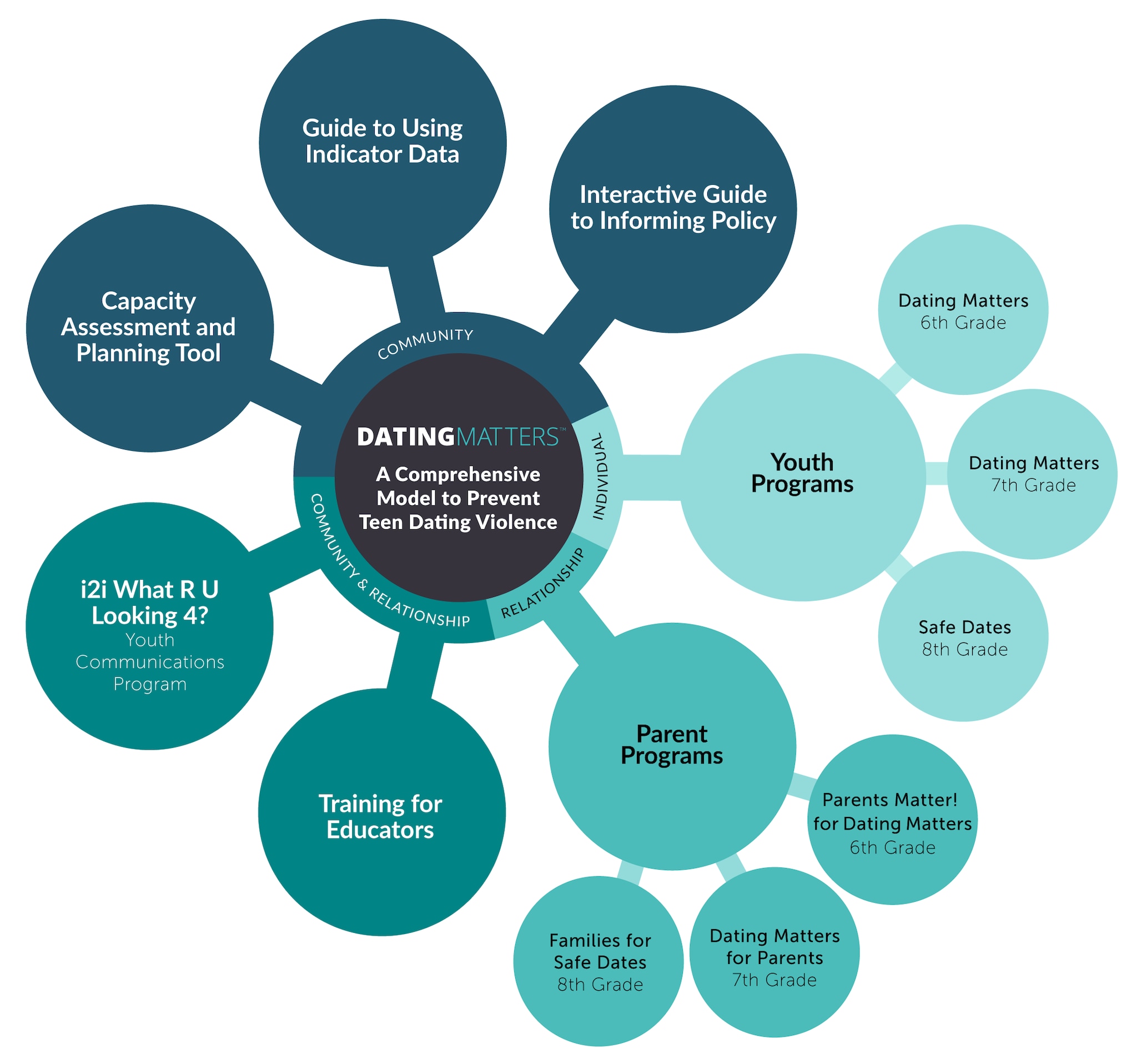About Dating Matters®
Dating Matters includes seven primary components that work together to reinforce protective factors and reduce risk factors for teen dating violence across the social ecology— at the individual, relationship, and community levels. These components also focus on preventing dating violence and promoting healthy relationships across the lifespan.
CDC’s Dating Matters was designed for local health departments with access to schools, community partners, state and local government, and other public health resources. However, other organizations can use the Dating Matters model to coordinate comprehensive dating violence prevention efforts in their communities.

The Dating Matters youth programs provide middle school students—ages 11 to 14– with the knowledge and skills they need to have healthy, safe relationships before they start dating. Research shows that supporting healthy emotional development can prevent a variety of negative outcomes, including teen dating violence. Research also shows that healthy relationship attitudes and behaviors start developing early. Below are brief summaries of the programs for 6th, 7th, and 8th graders that are a part of Dating Matters. All programs are designed to be delivered in school by teachers or prevention educators.
Dating Matters for 6th Graders
- 7 sessions
- Focuses on healthy relationships with friends, family, or in context of dating
- Teaches social and emotional skills, such as identifying emotions and coping with feelings
- Promotes and builds healthy relationship skills, such as communication and conflict resolution)
- Discusses ways to help and support friends in unhealthy relationships
Dating Matters for 7th Graders
- 7 sessions
- Reviews and builds on skills taught in the 6th grade program
- Increases focus on dating relationships and sexual violence
- Addresses social norms about substance use
Safe Dates for 8th Graders
- 10 sessions plus a play and poster contest
- Evidence-based program for preventing teen dating violence perpetration and victimization; shows sustained effects at 4 year follow-up
- For more information on Safe Dates visit the publishers websiteexternal icon
Parents have a crucial role to play in preventing dating violence. The Dating Matters parent programs provide parents of 6th, 7th, and 8th graders with skills that encourage positive interactions and communication with their children. The skills parents learn in these programs will help them talk to their kids about healthy, safe relationships. Below are brief summaries of the parent programs.
Parents Matter! for Dating Matters (6th Grade)
- 6 group sessions
- Adapted from an existing evidence-based program (Parents Matter!) to address dating violence
- Promotes positive parenting and effective parent-child communication on healthy relationship development and sexual health
- Supports parents in sharing their values and influencing their teen’s decisions about dating and sexual behavior
Dating Matters for Parents (7th Grade)
- 3 group sessions
- 3 in-home, self-directed activities that allow parents to practice skills learned in the group setting with their children
- Supports parents in using positive parenting skills, open and effective communication, appropriate supervision, and conflict resolution
Families for Safe Dates for Parents of 8th Graders
- 6 booklets mailed to parents to complete at home
- Booklets help parents and teens explore different topics about dating violence together
- Evidence-based program that showed decreased risk of physical dating violence victimization
Teachers, coaches, school personnel, youth leaders, and other youth-serving professionals play an important role in preventing teen dating violence. Dating Matters: Understanding Teen Dating Violence Prevention Training for Educators is a 1-hour, online training that helps educators understand the risk factors and warning signs of teen dating violence, as well as their role in promoting healthy relationships. The training uses a mixture of illustrations, exercises, and information from experts. CDC suggests that all educators implementing Dating Matters complete the training. The training is free and available here or you can order a free CD-ROM (in upper right corner search for Dating Matters).

i2i®: What R U Looking 4 is Dating Matters’ youth-focused communications program. i2i is designed to reinforce messages learned in the youth programs using technology and language that is relevant for middle school aged youth. It was informed by the attitudes, interests, and behaviors of 11-14 year olds—with youth focus groups, message testing, and co-creation workshops to create materials with CDC. The program is delivered using three main elements: Brand Ambassadors (15–18 year old “near peers”) who engage younger teens by hosting i2i events, social and digital media, and engaging written materials.

The DM-CAPT is an online tool to help local health departments, or community-based organizations, assess and improve their community’s capacity to implement a comprehensive teen dating violence prevention model, like Dating Matters. The DM-CAPT allows organizations to gather information directly from partners and stakeholders on their organizational and intervention-specific capacity, create capacity assessment reports, and work with partners to determine priorities and an action plan to build capacity. The tool is free and available here.

Using Indicator Data to Inform Teen Dating Violence Prevention: A Guide for Local Health Departments can help local health departments identify, collect, and use data on school and community-level indicators of teen dating violence. Collecting indicator data is an important first step in establishing a community-based teen dating violence system to track changes in teen dating violence over time.

The Dating Matters Interactive Guide to Policy helps local health departments conduct an analysis of their policies related to teen dating violence and provides information to inform future policy activities. It also provides an overview of policy approaches to dating violence prevention, guidance for developing a policy plan, and tools to support policy development. The online guide walks users through the policy process with the aid of worksheets, tools, and policy related resources. The guide is free and available here.